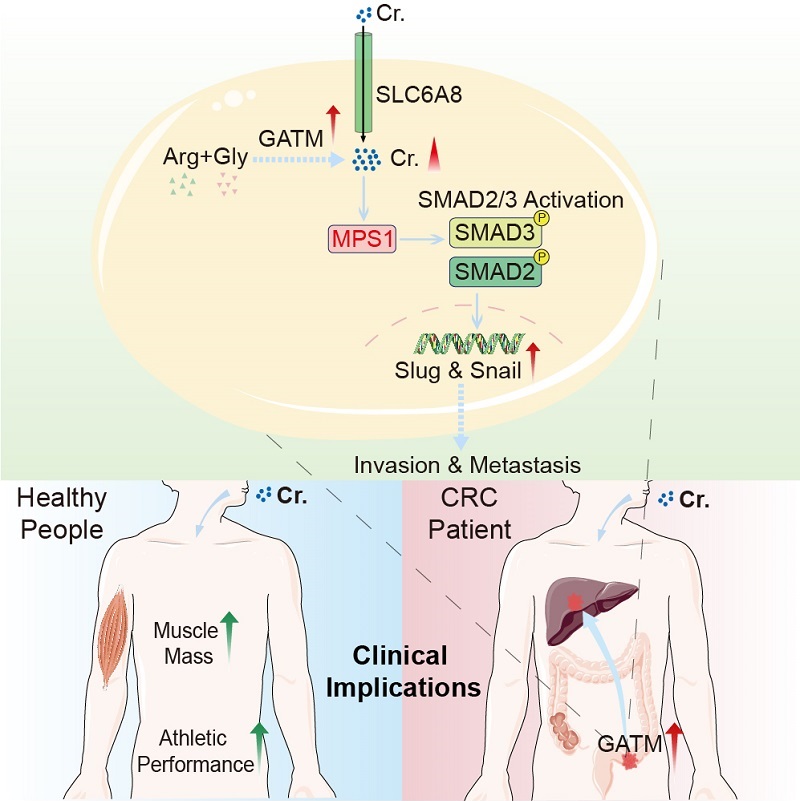Creatine promotes cancer metastasis through activation of Smad2/3
Recently, a research group led by Prof. BU Pengcheng at the Institute of Biophysics of the Chinese Academy of Sciences (CAS), in collaboration with PIAO Hai-long from Dalian Institute of Chemical Physics of the CAS and CHEN Gang from Chinese PLA General Hospital reported that creatine promotes cancer metastasis through activation of Smad2/3. This study was published in Cell Metabolism on April 2, 2021.
Colorectal cancer (CRC) is the third most deadly and fourth most commonly diagnosed cancer in the world, and the incidence has been steadily rising. About 25% of diagnoses cases has metastasized and 70% of CRC patients eventually develop liver metastasis. Hereditary CRC account for 7-10% of all cases, and diet are significant CRC risk factors(Rawla et al., 2019; Zacharakis et al., 2010).
Creatine is a nitrogen-containing organic acid that naturally exists in mammals. Creatine kinase catalyze creatine into phosphocreatine, phosphocreatine then participates in ATP metabolism, and acts as an energy buffer for muscle, brain and other energy-intensive organs(Wyss and Kaddurah-Daouk, 2000). As one of the most popular nutritional supplements, creatine has been widely used to increase muscle mass and improve athletic performance. Creatine supplementation has also been widely used in clinical trials such as creatine deficiency syndromes, neurodegenerative diseases and muscle atrophy(Persky and Brazeau, 2001). Creatine is also used for the treatment of cachexia in patients with colorectal cancer and other cancers, but it showed that creatine supplementation cannot improve the muscle function and quality of life of the patients(Norman et al., 2006). In addition, subcutaneous tumor-bearing model shows that creatine inhibited the growth of a variety of solid tumors. Creatine and its analog cyclocreatine have been considered tumor suppressor metabolite(Lillie et al., 1993; Miller et al., 1993).
To explore creatine function in cancer metastasis, the researchers used an orthotopic mouse model and found that dietary uptake creatine promoted the metastasis of colorectal cancer and breast cancer and shortened mice survival. They found that the rate-limiting enzyme for creatine synthesis, glycine acyltransferase (GATM), is up-regulated in liver metastasis. Clinically, high levels of GATM were significantly associated with poorer prognosis. GATM promoted CRC liver metastasis and shortened mouse survival, while targeting GATM or creatine transporter SLC6A8 reduced CRC liver metastasis and prolonged mouse survival.
To investigate the mechanism,they performed multi-pathway profiling array and found that creatine upregulated Smad2/3 phosphorylation. They further found creatine activated Smad2/3 signaling via monopolar spindle 1 (MPS1), a protein kinase associated with mitotic progression and spindle checkpoint. Creatine also upregulated downstream transcription factor Snail/Slug expression. MPS1 knockdown and specific inhibitor inhibited primary tumor invasion and cancer metastasis by down-regulating Snail/Slug expression, and prolonged mice survival.
This study called for using caution when considering dietary creatine to improve muscle mass or clinical treatment especially for cancer patients. They reported creatine activated Smad2/3 through MPS1, rather than transforming growth factor beta receptor (TGFBR) in the canonical TGF-beta pathway. They also suggested that targeting GATM or MPS1 prevents cancer metastasis, especially metastasis of TGFBR mutant colorectal cancers.
This work was partly supported by the Strategic Priority Research Program of the Chinese Academy of Sciences, the Chinese Ministry of Science and Technology, and the National Natural Science Foundation of China.

Fig.1 Schematic illustration of the mechanism that Creatine promotes cancer metastasis through activation of Smad2/3
Full text link: https://doi.org/10.1016/j.cmet.2021.03.009
References
1. Lillie, J.W., O'Keefe, M., Valinski, H., Hamlin, H.A., Jr., Varban, M.L., and Kaddurah-Daouk, R. (1993). Cyclocreatine (1-carboxymethyl-2-iminoimidazolidine) inhibits growth of a broad spectrum of cancer cells derived from solid tumors. Cancer Res 53, 3172-3178.
2. Miller, E.E., Evans, A.E., and Cohn, M. (1993). Inhibition of rate of tumor growth by creatine and cyclocreatine. Proc Natl Acad Sci U S A 90, 3304-3308.
3. Norman, K., Stubler, D., Baier, P., Schutz, T., Ocran, K., Holm, E., Lochs, H., and Pirlich, M. (2006). Effects of creatine supplementation on nutritional status, muscle function and quality of life in patients with colorectal cancer--a double blind randomised controlled trial. Clin Nutr 25, 596-605.
4. Persky, A.M., and Brazeau, G.A. (2001). Clinical pharmacology of the dietary supplement creatine monohydrate. Pharmacol Rev 53, 161-176.
Rawla, P., Sunkara, T., and Barsouk, A. (2019). Epidemiology of colorectal cancer: incidence, mortality, survival, and risk factors. Prz Gastroenterol 14, 89-103.
5. Wyss, M., and Kaddurah-Daouk, R. (2000). Creatine and creatinine metabolism. Physiol Rev 80, 1107-1213.
6. Zacharakis, M., Xynos, I.D., Lazaris, A., Smaro, T., Kosmas, C., Dokou, A., Felekouras, E., Antoniou, E., Polyzos, A., Sarantonis, J., et al. (2010). Predictors of survival in stage IV metastatic colorectal cancer. Anticancer Res 30, 653-660.
Contact: BU Pengcheng
Institute of Biophysics, Chinese Academy of Sciences
Beijing 100101, China
Email: bupc@ibp.ac.cn
(Reported by Dr. BU Pengcheng's group)

